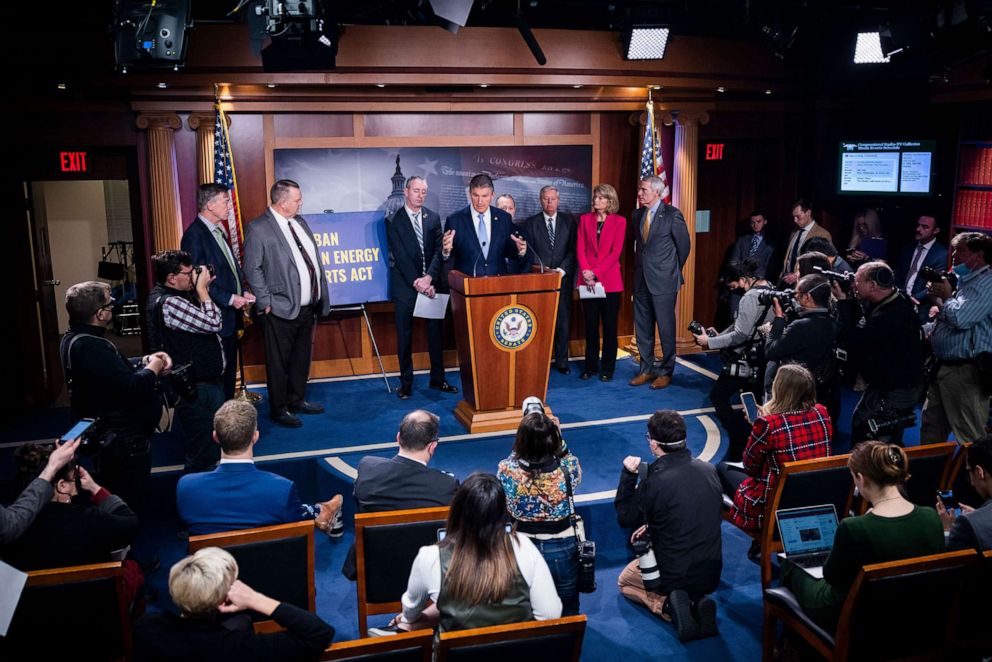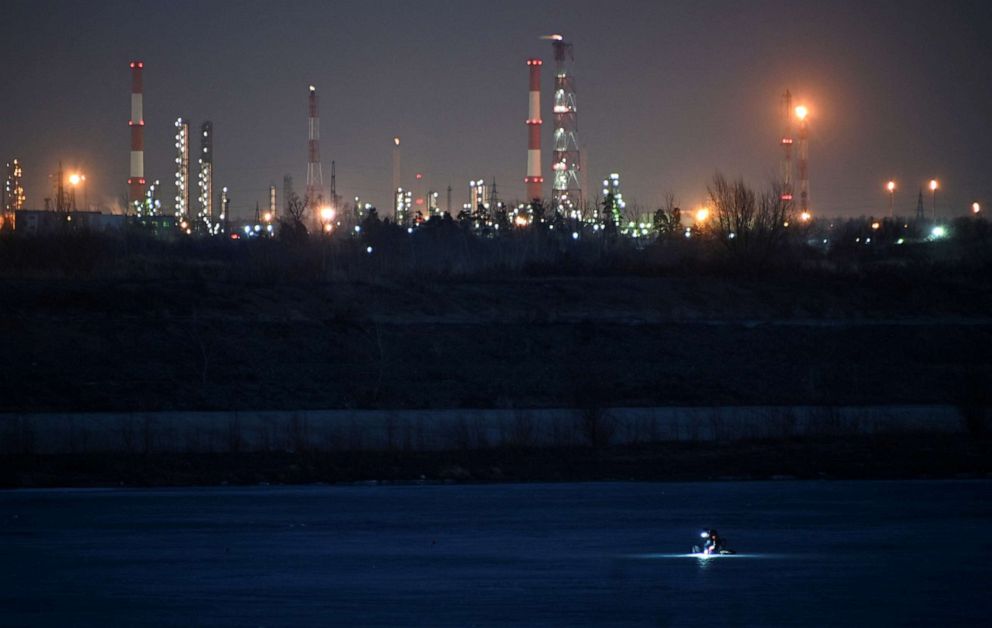Bipartisan calls for Russian oil ban meet resistance from White House
Experts questioned how much of an impact it would have on Russia.
Bipartisan calls are growing on Capitol Hill for the United States to ban imports of oil from Russia over its invasion of Ukraine, but the White House stopped short of an outright ban -- and experts said the impact would be limited.
The United States and other Western nations have imposed an unprecedented raft of sanctions on Russia, but they have created exceptions for the oil and gas sector -- from which the Russian government derives much of its income -- because of fears cutting off the supply would drive up energy prices around the world.
But Republican members of Congress have for weeks been calling for a ban on imports of Russian crude oil and petroleum products, saying it would kneecap Russian President Vladimir Putin more than the Biden administration's sanctions have so far.
"Putin's major source of revenue is selling oil and gas and Biden's given an exception," Sen. Ted Cruz, R-Texas, said Wednesday. "You can continue getting billions of dollars to fund the invasion of Ukraine."

Experts predict muted impact on Russia
Just 1% of Russia's total crude oil exports in 2020 went to the United States, according to U.S. government figures.
So while cutting off that trade would force Russia to find other buyers for that relatively small amount of oil, it would not have as significant of an impact as if Europe -- where Russia sends nearly half its oil -- stopped them, experts told ABC News.
And the crippling financial sanctions on Russia's banks and other parts of its economy have already turned off potential buyers of Russian oil who are wary of doing business in a country quickly becoming a financial pariah, the experts said.
"Russian oil has already been de facto sanctioned" by the United States and its partners, Patrick De Haan, the head of petroleum analysis at GasBuddy, told ABC News.
The global market has already started to react, according to Ben Cahill, an expert on energy security at the Center for Strategic and International Studies.
"For Russia, this is part of a bigger set of challenges -- which is a lot of people don't want to buy their oil," Cahill said. "There's a lot of self-sanctioning happening in the marketplace."

The U.S. relies on Russian oil more than Russia depends on sending its oil to the U.S., with about 7 to 10% of the United States' imports of crude oil and petroleum products coming from Russia in recent years.
De Haan said cutting off the supply would likely raise gas prices in the U.S. in the short term.
But Cahill said the switch would be "manageable," with the U.S. potentially turning to countries like Mexico, Ecuador, Colombia and Canada to replace the Russian oil.
Growing bipartisan support runs up against White House reluctance
Still, a slew of Democratic senators, as well as House Speaker Nancy Pelosi, on Thursday threw their support behind cutting off Russian oil imports.
A bipartisan group of lawmakers, led by moderate Democrat Joe Manchin, D-W.Va., and Republican Lisa Murkowski, R-Alaska, introduced legislation Thursday that would declare a national emergency and direct President Joe Biden to impose a ban.
But Biden already has such authority.
And while the White House has not completely ruled out the possibility, it has expressed concern it could lead to higher energy prices for Americans who are already being hit at the gas pump by record-high inflation rates.
"The president's objective has been to maximize impact on President Putin and Russia, while minimizing impact to us and our allies and partners," White House press secretary Jen Psaki said Thursday.

The group backing Manchin's proposal is bipartisan. Nine Republicans have signed on as co-sponsors. And Democratic supporters span the caucus from traditionally moderate members like Sen. Jon Tester, of Montana, to more progressive members like Hawaii Sens. Mazie Hirono and Brian Schatz, and Connecticut's Sen. Richard Blumenthal.
"Putin has weaponized energy," Tester said. "I don't believe this country should be importing anything from Russia, but the fact of the matter is energy is something Putin depends upon for his finances, and he is depending on it to fight this war in Ukraine."
Sen. Ed Markey, D-Mass., has offered a separate bill that would also ban Russian oil imports. In addition, his legislation would require a report identifying entities involved in the import of Russian crude oil and petroleum products into the U.S. -- and impose sanctions on those entities based on the report's findings.
House Speaker Nancy Pelosi gave the effort her stamp of approval Thursday.
"I'm all for that," Pelosi told reporters. "Ban it. Ban the oil coming from Russia."
Manchin said Americans should be willing to make a sacrifice.
"You talk about an inconvenience, can you imagine if you lived in Ukraine right now?" Manchin said. "If there was a poll being taken and they said, 'Joe, would you pay 10 cents more a gallon to support the people of Ukraine and stop, basically, the support of Russia?' I would gladly pay 10 cents more a gallon."

Republicans call for new drilling on US public lands
Pelosi was clear that she did not back an increase on oil and gas drilling on federal land, which the Biden administration has restricted -- and which Republicans want.
While the bipartisan bill makes no mention of domestic production, many Republican lawmakers -- and some Democrats, including Manchin -- see the two policies going hand in hand.
An increase in U.S. production would blunt rising oil prices and provide a global alternative to Russian oil, they argue.
"We must dramatically increase domestic production of energy to support the energy needs of American consumers without causing increased financial burden," Manchin said in a statement Tuesday.
Increasing U.S. oil production is a controversial move. Many Democrats applauded steps taken by the administration for sidelining the Keystone XL pipeline project last year and taking steps to pare back production in favor of greener energy sources earlier this year.
But the White House says oil companies have access to plenty of places to drill, and the Biden administration supports investing in clean energy in the long term to prevent a reliance on foreign oil.
Cahill said there are signs U.S. producers are already reacting to demand that increased even before the war in Ukraine -- and that most of the new drilling would take place on private land.
"This industry mostly takes its signals from Wall Street, and the market is going to take care of some of this on its own," Cahill said. The White House lending its rhetorical support could help, though, he said.
Murkowski echoed that sentiment.
"If the president were to come before the American people and give a speech and say we in this country need to embrace the role that we can take on as a full energy producer," she said, "I think that that would do as much to send a signal to help calm the markets to help address what we are seeing with the daily prices of fuel at the pump."
ABC News' Zunaira Zaki contributed to this report.